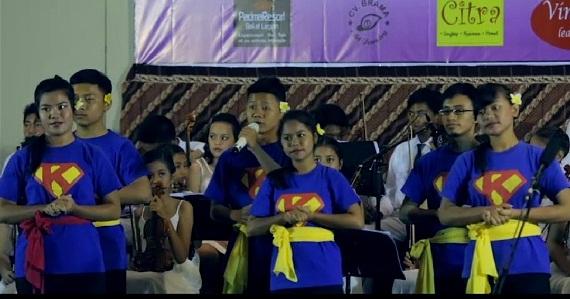CERITA
‘When We See People Together Having Family Events And They Have Dads It’s Really Hard’
"12 years after the Bali bombings, families who have lost loved ones, are struggling to put their lives back together."
Rebecca Henschke

35 Indonesians were killed in the 2002 Bali bombings in Kuta, Bali. Their children are now growing up without them.
Today they are rehearsing for a performance to mark the anniversary of the deadly terrorist attack.
15 year old Alief’s father was driving home through Kuta the moment the twin bombs went off.
He never made it home to his young family.
“It’s had a huge impact on our lives. My mum had to become a single parent. When we see people together having family events and they have dads it’s really hard,” said Alief.
The Indonesian men who carried out the attack said they were following the call of Osama Bin Laden to kill American civilians in revenge for the killing of Muslims in Afghanistan by the United States.
But Alief is also Muslim and so was his father who was killed.
“Here everyone is family, here there is no difference between race and religion. I think they were taught very very differently from us—in a really bad way. Islam doesn’t teach violence. Their thinking is very very wrong. I am really angry and disappointed but what can we do maybe it’s the way of God that we just have to accept,” he said.
Watching her three daughters’ practice their performance is Nyoman Rencini.
Her husband, Ketut Sumarawa, worked as driver who was waiting for tourists outside Paddy’s Pub when the bomb went off.
Their family was poor before her husband died but as single mother life as been extremely tough.
“As a mother I really want to be able to raise my children like other people… to make them happy and give them what they need. All I can do is give them advice and tell them what they can’t do. I can never say ‘Yes you can do that’. I can just say ‘no you can’t, be patient’—that’s all,” she said while fighting back tears.
She says her youngest daughter who was very close to her father was the worst affected.
“She started acting very abnormally; I mean she was normal but she was acting so strangely. I kept getting called to the school and told that she was skipping class,” she explained.
In a hotel room not far from where the bombings exploded a group therapy session is taking place.
A young girl Lina stands up to ask the psychiatrist about how to help her younger sister who is refusing to go to school.
“My sister tells my mum that she will go but then suddenly changes her mind and my mum is really stressed and heart-broken about this.” She thanks the doctor and sits down.
Psychiatrist Made Nyandra says not going to school is a symptom of some deeper issue—he tells her mother not to punish her daughter but to come for some private therapy sessions.
Today’s event is organized by Paguyuban Isana Dewata, a community for the widows, widowers and children of the local victims of the Bali bombings.
Ni Luh Erniati is the group’s chairwoman. She is raising two children alone after her husband Gede Badrawan was killed.
“The hardest one was the youngest – he was just one and a half years old and didn’t understand anything. He could just say ‘Pop’…he was so happy if any man showed him any attention. He cried for a week. I used to say that he was working but when he was in 4th grade he started looking at his father’s photo all the time. So that was the time I told him….your dad is not coming home…he is in heaven. Please don’t cry…if you love me, please don’t cry because I will be sad. I said this while crying….he stopped crying because he didn’t want to see his mother crying,” recalled Ibu Erniati.
She says members of her community were now concerned about the emergence of the Islamic State (IS) organization.
She is also worried about some members of the terrorist group Jemaah Islamyiah now being released from jail.
“In jail they might say they have changed and realized what they have done is wrong but when they get out and they join their friends then they return to the violent path,” she said.
For now she is focused on creating tolerance amongst the next generation.
Her organization - which runs on donations-, has given scholarships so that the children of bomb victims can finish school.
And they are an impressive group of young people.
At one of the anniversary events in front of the Bali governor and other diplomats -- Nyoman Rencini’s youngest daughter a poem…
It talks about how the victim support group has become her family and helped her get out of the dark cloud she was under following her fathers dead.
14 year old Alief has clear plans for what he wants to do with his life.
“Ever since I was little I wanted to be a pilot. After I finish high school I want to go to pilot school,” he said proudly.
His younger brother, Aldi, likes to sing and is a soloist when the group performs in front the audience of more than 500 people that night.
- eng
- Bali bombing
- children of victims
- therapy
- terrorism
- deradikalisasi
- DRL
Komentar (0)
KBR percaya pembaca situs ini adalah orang-orang yang cerdas dan terpelajar. Karena itu mari kita gunakan kata-kata yang santun di dalam kolom komentar ini. Kalimat yang sopan, menjauhi prasangka SARA (suku, agama, ras dan antargolongan), pasti akan lebih didengar. Yuk, kita praktikkan!